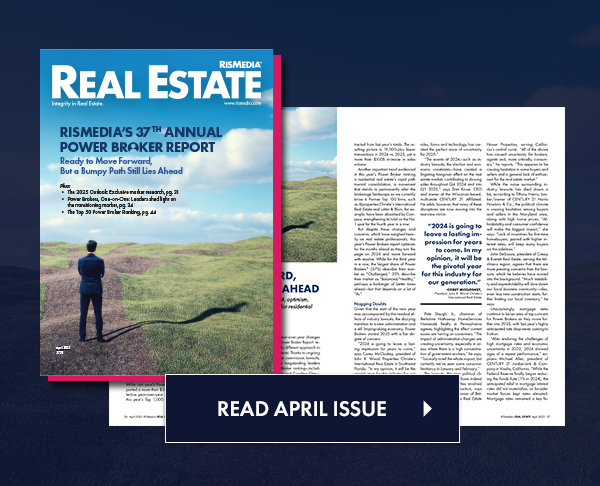Editor’s note: This story is the first part of a two-part RISMedia report on the effects of institutional homebuyers on markets and housing. Look for part two in the coming days.
For many, real estate isn’t just a home, it’s an investment—especially when that buyer is a large financial institution. This documented trend of institutional investors goes back to the aftermath of the 2008 financial crisis, which created foreclosed inventory for these firms to snatch up.
The typical strategy of institutional buyers is to buy single-family home units and turn them from homeowner residentials into rental units. Homes that would’ve once been owned by the homeowner and go through the natural cycle of resale are instead rented out in perpetuity.
But what may finally put a dent in institutional buyers’ hold on inventory is not market forces, but legislative intervention. Maura Neill, an agent with RE/MAX Around Atlanta tells RISMedia that one reason solicitations have slowed down in Atlanta is because the Georgia legislature put new regulations on how those solicitations can be carried out.
“(New legislation) hasn’t made it harder for the hedge fund buyers to purchase because, of course, capitalism,” says Neill. “But I’m not seeing the same level of aggressive offers on my owner-occupied properties as I was.”
Speaking to RISMedia in 2023 (near the height of institutional buyer activity in her city), Neill said that homeowners often dealt with mail solicitation offers that emphasized a speedy transaction over all else, in a way that could hurt an uninformed seller.
Here in 2024, Neill outlined ways that institutional buyers can prevent homeowners from getting their money’s worth.
“Oftentimes more often than not, they’re cash buyers. However, what I have noticed is more often than not, they’re low ballers. They don’t necessarily want to pay fair market value because they want a deal. If you are an agent on the listing side and you are in a market where that’s happening, I think educating yourself and educating your sellers when you present an offer, doing some research about the buyer or the LLC that is the buyer, and letting your client know that if the price is right and it’s the right offer for them, they should take it, of course, because you have to do what’s in your client’s best interest.”
These firms have also garnered a reputation as “absentee owners,” ones that don’t physically maintain the empty homes they hold—something that lawmakers are hearing about.
State Senator Louis Blessing, III (R-OH), whose district is located in the Cincinnati metro area, tells RISMedia that he has received numerous complaints from his constituents in Hamilton County about this.
“It’s gotten so bad in that community that the local joke is that, well, we don’t call it Northbrook anymore. We call it VineBrook (the name of an institutional landlord in Ohio) because they own so many homes. Last time I checked, it was I think a year ago, they own somewhere between 500, 600 homes in the township alone…(t)he biggest complaints, at least in Colerain Township were (that) they don’t keep up the properties. There’s building code violations. They just don’t take care of anything, and they are ruining the community.”
Most experts agree that the peak of institutional single-family home-buying was 2022. Since then, these firms have proven they aren’t immune to market slowdowns like any other buyers. Higher interest/mortgage rates mean that not only are fewer people selling their homes, it also disincentivizes these firms because higher prices eat into their profit margins.
This slowdown has meant less solicitations, as Neill attested to RISMedia. Phoenix, Arizona, was—like Atlanta—a prime target for institutional buyers during their home-buying phase. However, Troy Reierson, CEO of Berkshire Hathaway HomeServices Arizona, California and Nevada Properties, tells RISMedia that REALTORS® working under him have not found institutional buyers to be of much competition recently.
“Other than an annoyance from text messages and low ball offers, (my brokerage leaders) are not feeling investors are hurting their business. Inventory is on the rise, listings are sitting a bit longer and some additional price improvements are a larger distraction at this time,” he says.
However, while these firms may not be buying homes in as large numbers, they aren’t selling their existing inventory either. Concerns about inventory being cordoned from the buying market are thus unaddressed. Further reporting suggests that these firms are moving from buying to consolidation; in January 2024, investment giant BlackStone acquired Tricon Residential, one of the “big three” institutional buyers (alongside American Homes 4 Rent and Invitation Homes) and its estimated 37,000-unit stock.
Legislation targeting institutional investors can take different forms. For example, Georgia House Bill (HB) 1292, passed in May 2024, mandates a disclosure in solicitation offers about whether the offer is below the home’s market value or not.
Neill says these investors are still looking to acquire certain types of properties in Atlanta, despite shifts in the market and new legislation.
“I have a couple of fixer-uppers, and of course we’re still getting those types of offers because I do think that’s the ideal buyer when a property needs a considerable amount of work that perhaps at the current interest rates, a typical buyer looking for their primary residence wouldn’t necessarily be making offers on extreme fixer-uppers.”
Both national- and state-level legislators have also noted concern about the presence of financial firms in the single-family home market—and potential disadvantages to homebuyers—and are pushing more direct intervention than seen in Georgia.
Legislation at all levels
On the national level, Senator Amy Klobuchar (D-MN), chair of the Competition Policy, Antitrust and Consumer Rights subcommittee, wrote a letter on May 13, 2024 urging the Federal Trade Commission (FTC) to police institutional landlords. Specifically, Senator Klobuchar asked that the FTC include real estate acquisitions as part of its antitrust reporting.
Senator Klobuchar’s letter notes that a federal antitrust law passed in 1976 “exempts acquisitions of goods or realty transferred in the ordinary course of business from these reporting requirements (because) these exemptions were created nearly 30 years ago when it was widely believed that such acquisitions could never violate the antitrust laws.”
“This is no longer the case,” Klobuchar argued in the letter, saying that over 50% of rental units in the U.S. are owned by institutional investors.
State legislatures are often where legislative initiatives first come to fruition, however. State Senator Nancy Skinner (D-CA) proposed SB 1212, a bill that would outright ban corporate landlords from buying or leasing single-family homes in the state of California. While Senator Skinner’s staff tells RISMedia that her bill has “died in committee” and is not a priority for the senator, the effort is being carried on by California Assemblymember Alex Lee (D), who has sponsored AB 2584, a buying/leasing ban on “business (entities that have) that has an interest in more than 1,000 single-family residential properties.”
“Mega corporations are outcompeting new homeowners, buying up existing single-family homes and converting them to rentals. They’re taking homeownership opportunities away from hardworking families. For instance, Invitation Homes owns roughly 12,000 rental homes in California alone,” Lee tells RISMedia. “With the rate of investor purchases spiking during COVID-19 and the Great Recession, it’s critical that we prevent corporations from taking advantage of economic downturns and the housing shortage.”
In Ohio, Blessing has proposed another bill tackling this issue that uses different means to the same effect of making institutional landlords divest from properties. This bill would achieve that via taxation; any entity that owns more than 50 one-unit, two-unit or three-unit properties in Ohio would be subject to a $1,500 a month tax per property.
“So for context, we’re talking tens of millions per year in taxes on this. The idea is that they can’t pass that on to the tenant. It’s too high of a tax, they can’t compete. They will have to sell, nor can they spread that cost out,” Blessing tells RISMedia. “It’s really an antitrust bill in the sense that it’s like nobody should be able to hoard housing the way that these guys do.”
Indeed, legislation analysis entity the Ohio Legislative Service Commission found that the bill, if passed, would be unlikely to actually raise much tax revenue for the state of Ohio because those subject to the tax would likely sell their properties. That, per Senator Blessing, is the entire idea.
When asked why he prefers to accomplish this via taxation rather than an outright ban, Blessing explains that “(i)t’s hard to just say you’re going to do a ban on something like this…for me, going the taxation route is something that state legislatures and Congress have broad taxation powers. I think it passes more constitutional muster, and you have effectively the same result that it’s going to force them to sell these properties.”
Blessing notes that the bill also includes language about “common control” to avoid entities evading the tax by operating under different LLCs.
“Even though VineBrook operated through 90 separate LLCs, they are under common control, common ownership,” he says. “So there is language in there to combat that. And so if they decide they’re going to try to evade the taxes, they get hit with a felony fine and a significant tax penalty on that as well.”
On the issue of corporate identity, Blessing notes that the area of his bill with the most bipartisan support is the creation of a voluntary “registry” program:
“My Democratic colleagues are supportive of these things (changing tax incentives). My Republican colleagues are quite skeptical. They view it as, ‘Well if somebody gets to own thousands of properties and they did it through the free market, well that’s just wonderful for them.’ I obviously disagree with that. But they did say there is a problem with local governments not knowing who these entities are. There is a problem with them not fixing building code violations and letting properties fall into disrepair. So give the locals tools to go after ’em, which of course they were silent on remedies in that space.”
Check back at RISMedia for part two of this story.











